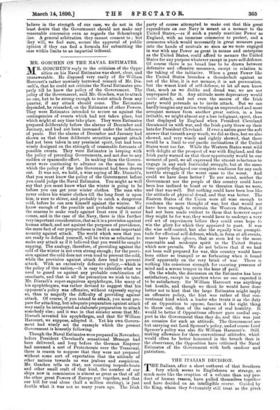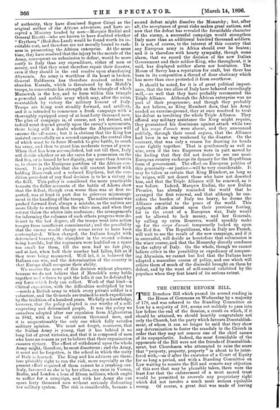THE ITALIAN DECISION. T HE Italians, after a short outburst of
that Southern fury which seems to Englishmen so strange, so much more like the eruption of a volcano than any pro-- duct of human reason, have pulled themselves together and have decided on an intelligible course. Guided by the King, whom they fintunately still treat as the pivot of authority, they have dismissed Signor Crispi as the original author of the African adventure, and have ac- cepted a Ministry headed by men—Marquis Rudini and General Ricotti—who are known to have doubted whether " Erythrea" (Red-Sea-Land) would be found worth its in- evitable cost, and therefore are not morally bound to rash- ness in prosecuting the African enterprise. At the same time, they have resolved that the injury to the morale of the Army, consequent on submission to defeat, would be more costly to Italy than any expenditure, either of men or money, and that they must therefore repair their disaster, even if they should in the end resolve upon abandoning Abyssinia. An army is worthless if its heart is broken. General Baldissera has therefore received orders to abandon Kassala, which is threatened by the Mahdi's troops, to concentrate his strength on the triangle of which Massowah is the key, and to form within this triangle a powerful and mobile army which may, after the rains, re-establish by victory the military honour of Italy. Troops are being sent steadily forward, and artillery, and it is intended to commence a fresh campaign with a thoroughly equipped army of at least forty thousand men. The plan of campaign is, of course, not yet devised, and indeed must depend greatly upon the enemy's movements, there being still a doubt whether the Abyssinians will assume the offensive ; but it is obvious that the King has insisted successfully on a second campaign, the central idea of which must be to force Menelek to give battle, to crush his army, and then to grant him moderate terms of peace. When that has been accomplished, but not till then, Italy will decide whether or no she cares for a possession on the Red Sea, or is bound by her dignity, any more than Austria is, to share in the European partition of the African con- tinent. It is probable that she will content herself with holding Massowah and a reduced Erythrea, but the con- dition precedent of any final decision is to be a victory in the field. This policy is considered the more practicable becaute the fuller accounts of the battle of Adowa show that the defeat, though even worse than was at first re- ported, was at least in part due to grievous mismanage- ment in the handling of the troops. The native column was pushed forward first, always a mistake, as the natives are more likely to retreat than the white men, and when they retreat throw the whites into confusion ; the arrangements for informing the columns of each others progress were de- ficient to the last degree, all the troops went into action hungry from insufficient commissariat ; and the possibility that the enemy would charge seems never to have been contemplated. When charged, the Italians fought with determined bravery, the slaughter in the second column being horrible, but the regiments were huddled on a space too small for them, till the men had no fair play, and at last, when half their number had fallen, felt as if they were being massacred. Well led, it is believed the Italians can win, and the determination of the country is that Europe shall recognise their ability.
We receive the news of this decision without pleasure, because we do not believe that if Menelek's army holds together and refuses to quit the hills it can be defeated by any force which Italy can collect. Work of that kind—a Chitral expedition, with the difficulties multiplied by ten —needs a British army in which every private soldier is a volunteer, and the Generals are trained to such expeditions by the tradition of &hundred years. We fully acknowledge, however, that the policy adopted is one worthy of a self- respecting and determined people. It was the policy we ourselves adopted after our expulsion from Afghanistan in 1842, with a loss of sixteen thousand men, and it is unquestionably the only one which fully satisfies military opinion. We must not forget, moreover, that the Italian Army is young, that it has behind it no long list of great victories, and that it is composed of men who have no reason as yet to believe that their organisation ensures victory. The effect of withdrawal upon the whole Army might, therefore, be most disastrous ; and the Army, it must not be forgotten, is the school in which the unity of Italy is learned. The King and his advisers are there- fore probably right to run the risk, more especially as the present effort required of them cannot be a crushing one. Italy, favoured as she is by her allies, can raise in Vienna, Berlin, and London a loan of fifteen millions, which ought to suffice for a campaign, and with her Army she can spare forty thousand men without seriously dislocating her military system. The risk is considerable, because a second defeat might dissolve the Monarchy; but, after all, the acceptance of great risks makes great nations, and now that the defeat has revealed the formidable character of the enemy, a successful campaign would strengthen Italy more than an additional hundred thousand soldiers. It is not, of course, to the interest of this country that any European army in Africa should ever be beaten; and it is therefore with hearty sympathy, though some alarm, that we record the decision of the new Italian Government and their soldier-King, who throughout, it is said, has displayed neither alarm nor hesitation. The House of Savoy has a reputation for craft, but there has been in its composition a thread of dour obstinacy which has more than once protected it from overthrow.
It should be noted, for it is of great political import- ance, that the two allies of Italy have behaved exceedingly well,—so well that they have probably recement,ed the Triple Alliance. Although the African enterprise was no part of their programme, and though they probably do not believe, as King Humbert does, that his Army needed an exercise-ground, they at once resolved to treat his defeat as involving the whole Triple Alliance. They offered any military assistance the King might require, they guaranteed his dominions against attack while two of his corps d'armle were absent, and they announced publicly, through their usual organs, that the Alliance had been in no way weakened by the disaster. On the contrary, that was only a reason for drawing its bonds more tightly together. That is gentlemanly as well as wise, even if the two Emperors were in part moved by the feeling that they did not desire to see one more European country exchange its dynasty for the Republican form of government. The effect on European politics of this generosity—or justice—will be very considerable. It may be taken as certain that King Humbert, as long as he reigns, will not desert those who have not deserted him, and that the Triple Alliance will be renewed, as it was before. Indeed, Marquis Rudini, the new Italian Premier, has already reminded the world that he arranged the first renewal, and that although he con- siders the burden of Italy too heavy, he deems the Alliance essential to the peace of the world. This replaces affairs almost upon their previous footing, for in the event of a European war, Italy would not be allowed to lack money, and her Generals, by calling up extra Reserves, would speedily make up for the corps d'armie temporarily locked up upon the Red Sea. The Republicans, who in Italy are French, will wait to see the result of the new campaign, and if it is successful, will decide as heretofore that submission is the wiser course, and that the Monarchy directly conduces to the safety of Italy. On the whole, though we cannot believe either in the possibility or expediency of conquer- ing Abyssinia. we cannot but feel that the Italians have adopted a masculine course of policy, and one which will relieve them of much of the discredit brought on them by defeat, and by the want of self-control exhibited by the populace when they first heard of its serious extent.







































 Previous page
Previous page